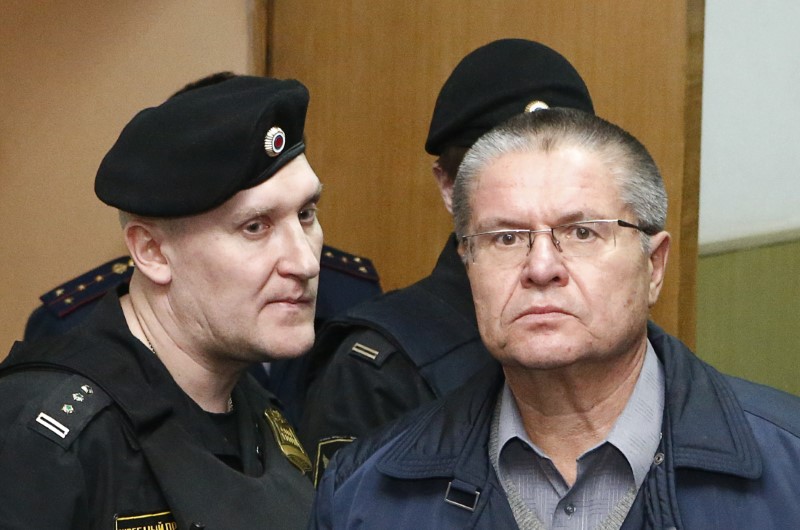By Polina Nikolskaya and Olesya Astakhova
MOSCOW (Reuters) - Former Russian Economy Minister Alexei Ulyukayev told his bribery trial on Wednesday that he had been framed by a close lieutenant of President Vladimir Putin into accepting a payment of $2 million.
The accusation against Igor Sechin, head of Russia's biggest oil company, thrust into the open simmering tensions between rival Kremlin clans - a spectacle rarely seen in public in the 17 years since Putin first became president.
Ulyukayev was detained on Nov. 14 last year, moments after Sechin personally handed him the cash in a late-night meeting that, according to prosecutors, was a sting to catch the minister in the act of accepting a bribe.
The case is politically charged because Sechin represents a powerful faction in the Kremlin who favor greater state control over the economy. They have clashed with economic liberals in the government, a group that included Ulyukayev.
A spokesman for Rosneft, the state oil company headed by Sechin, said on Wednesday there was exhaustive evidence to show that Ulyukayev had taken a bribe.
Speaking in court at the beginning of his trial, Ulyukayev said Sechin had made false allegations to the Federal Security Service, or FSB, that he was extorting a bribe, and then tricked him into coming to the meeting at Rosneft's headquarters on the banks of the Moskva river.
"There is no objective evidence against me. The charges were fabricated," Ulyukayev said.
"In the absence of any objective evidence, an allegation was fabricated against me, based exclusively on Sechin's testimony, that I supposedly extorted a bribe from him," the ex-minister, dressed in a blue and white striped polo-shirt, told the court.
"The handing to me of the money was planned in advance by FSB officers who, based on Sechin's false testimony, were waiting (for me) to make an illegal demand for a bribe."
When no such demand was made, Ulyukayev said, "Sechin called me himself and on the pretext of discussing important issues regarding the company's activities, and wanting to show me the company, persuaded me to come."
"Simple common sense is enough to understand the absurdity of the allegation," Ulyukayev said. He did not dispute that he took the cash, or give an explanation of why he took the money.
ROSNEFT DEAL
The prosecutor in the case, Boris Neporozhny, told the court Ulyukayev had told Sechin in October last year he expected to be paid a bribe in exchange for approving a deal which Rosneft was working on. He threatened to block the deal if he was not paid, the prosecutor said.
That deal was for Rosneft to acquire a controlling stake in mid-sized oil company Bashneft, which was being sold by the Russian state. Rosneft acquired the stake last year.
The prosecutor said that Sechin, after the initial conversation, reported Ulyukayev to the FSB, who then set up the sting operation. Ulyukayev was detained outside the Rosneft offices as he put the money in the trunk of his official car, Neporozhny said.
Mikhail Leontyev, a spokesman for Rosneft, did not comment directly on the allegations that Sechin framed Ulyukayev, saying only that the ex-minister had chosen that tactic in his defense "given his difficult position."
But Leontyev said the court had been presented with exhaustive evidence that a crime was committed.
"We would note three things: (there was) an acknowledgement that a crime was committed; the fact is that Ulyukayev himself demanded an illegal reward for carrying out his direct duties; he came himself to the meeting and left the meeting venue with money."
Tensions have been simmering for years between Kremlin clans, according to people with direct knowledge of the rivalries, but it is highly unusual for them to spill out in such a public and dramatic fashion.
Sechin is one of Putin's closest lieutenants and the two men have known each other for decades. He has been instrumental in increasing the power and wealth of state companies, often by winning Kremlin backing to take over the assets of private firms.
That has been resisted by economic liberals, who include several figures in the government and others with influence over Putin. They argue that state firms are suffocating the private enterprise Russian needs to nurture in order to grow its economy.

Kremlin observers said that Ulyukayev's arrest last year had weakened the hand of the economic liberals.